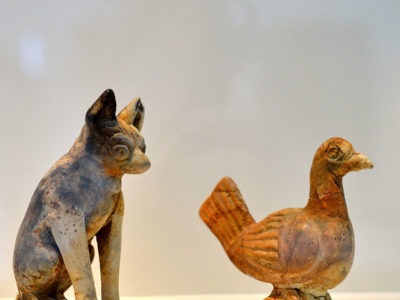I WAS SURPRISED to read what a Roman dog owner in Jesus’ day said in tribute to the pet dog he buried.
I was surprised because I know that Romans had a ritual of crucifying some dogs each year.
Romans crucified the dogs for a reason that makes no sense to me. Crucifixion certainly didn’t serve as a deterrent to other dogs.
The annual ritual dated back to an ancient battle when invaders had overrun all of Rome except for the Capitoline Hill, where a remnant of Romans would make their last stand.
Under cover of darkness, invaders started climbing up the cliffs. Dogs slept through it.
Geese became the alarm that woke the sleeping defenders, who fought and survived, no thanks to dogs.
Romans commemorated the event by parading a lucky goose through town, along with crucified dogs, whose goose had been cooked.
I don’t see the value of doing either. I’d cook the goose and walk the dogs.
Words to bury a Roman dog
Lucius Junius Moderatus Columella (AD 4-70) wrote books about farming, livestock, and agriculture around the time of Jesus. He covered those topics in a 12-volume set called Rural Matters (De Re Rustica).
He apparently had a pet dog that died, because he wrote a heartfelt goodbye to Patricus. Here’s a paraphrase of the epitaph.
“Tears filled my eyes as I carried our little dog to the grave.
Oh, Patricus. You’ll never again soak me with a thousand kisses. You’ll never again climb up onto my lap and sit contented. I was so sad when I buried you. But you deserved a good burial.
I’ve given you a resting place of marble in the shade, forever by my side. Wisdom was one of your qualities, much like the wisdom of a human being.
Oh, how much we loved you, our companion and our friend. Oh, what a painful loss.”
I haven’t had to bury a dog yet. But the day is coming, if Buddy doesn’t bury me first. Buddy is our Labrador Retriever. Within a few years, perhaps, he’ll leave us.
I know it will hurt because I’ve seen what the death of a family dog has done to relatives and friends. It’s wrenching pain.
It’s love’s fault. But love is worth the pain, I think.
For now, we’ve got Buddy’s companionship and his almost unconditional love. He does expect treats at 10 a.m., noon, and 2 p.m along with meals at 8 a.m. and 5 p.m. Otherwise, it’s unconditional.
If you’re interested in more about dogs in the Roman Empire, you can take a look at the current edition of Biblical Archaeology Review, “From Pets to Physicians: Dogs in the Biblical World,” by Justin David Strong, May/June 2019.


Leave a Reply